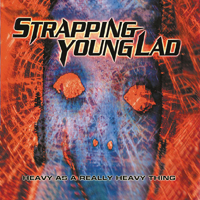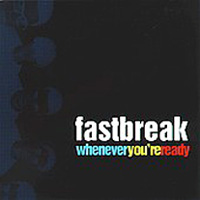 Fastbreak
Fastbreak
Whenever You’re Ready (Revelation)
An interview with vocalist Patrick Rorick and bassist Don Raymond over Chinese food.
by Tim Den
I read a Fastbreak interview when y’all were fifteen. How old are you now?
Don: Neil (guitar), Steve (guitar), and Luke (drums) are all twenty-one. Patrick and I are twenty.
Which members play in other bands?
Patrick: Just Luke (in In My Eyes). Actually, I play in another band, too. I always forget that because the band isn’t full-time. (laughs)
What band?
Patrick: Right Brigade. It’s stripped down, grass roots hardcore. Harder… because Fastbreak got softer. (laughs)
Don: Neil used to play in In My Eyes too.
How come he’s not with them anymore?
Don: I think he wanted to concentrate on Fastbreak more. Another reason is Neil wasn’t straight-edge anymore. Not that In My Eyes have a real big problem with it, they just wanted to be a straight-edge band.
Patrick: And I think he was getting a little sick of that “scene.” Not that we don’t play to that audience, and not that Luke and I aren’t straight-edge – because we do have straight-edge members in the band – and we did kind of start off as a straight-edge band…
Elaborate a little on the “scene” you speak of.
Patrick: The straight-edge scene or the hardcore scene? Or the scene within the scene? (laughs)
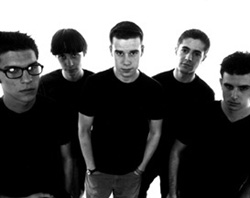 The audience that you said Neil got sick of playing to.
The audience that you said Neil got sick of playing to.
Patrick: Well, straight-edge, for one thing, is very binding… It’s like religion, it gets people together. But you realize later that people in that scene are very fickle. They wait for the approval of everyone else before they can follow a trend, follow a sound, follow an idea, rather than thinking for themselves as individuals.
Do you see a lot of that in this scene?
Patrick: Um… (hesitates) yes. But to say I haven’t fallen for it would be a lie, too, because we’ve been playing this kind of music since we were fifteen. We got into it as straight-edge fanatics. Not to say that I don’t love hardcore and I don’t love straight edge, but there’s definitely a lot more gray area than I first saw.
Well, you were also only fifteen.
Patrick: Yeah, and everything was really black and white then.
Don: You’re still living high school politics at that point.
Trying to find an identity for yourself, taking a hard stance on something; it gives you opinions and personality.
Patrick: Usually something cliquey.
Both of you’ve been in the band the whole time, and you’re originally from Connecticut?
Don: We grew up together. Steve as well. The three original members are all from the same town in Connecticut. Luke and Neil are from a different town in Connecticut. It’s kind of nice: we have two towns represented, and two long-time groups of friends.
Patrick: And we know each other too well. (laughs)
How long has the band been around?
Patrick: About five years. We put out our demo in ’94.
Don: We were around for about a year before that as a cover band.
Patrick: Learning how to play… We’re still learning how to play.
Don: I didn’t know how to play ’til last year. (laughs)
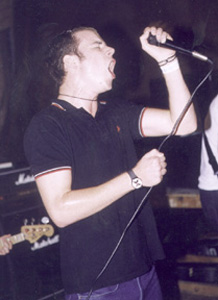 Patrick: I’m still learning how to sing, so I don’t know what you’re talking about. (laughs)
Patrick: I’m still learning how to sing, so I don’t know what you’re talking about. (laughs)
When did you all move up to Boston?
Patrick: Steve, Luke, and Neil all came up here for college. Don stayed in Connecticut, and I went to a school in New York City. But Don and I came up here last year.
How did the band function when you were apart?
Don: We commuted.
Patrick: It was killing us. I’d take the train down to Connecticut…
Don: I’d drive half an hour, pick him up, then drive up to Boston. It took about two and-a-half hours. We’d practice, and maybe stay the night.
Patrick: We were trying to write a record at that point, too. It was during Christmas break of my first year of school that I took the train directly to Boston. After the rest of the band had recorded the music for two days, I laid down my vocals. It was hectic. It wasn’t a fun process.
What record was this for?
Both: Fast Cars, Fast Women.
But now you’re all up here…
Patrick: It helped Whenever You’re Ready because it was written after I got up here. It feels more like an album.
If everyone hadn’t moved to Boston for college, would Fastbreak have moved from Connecticut?
Patrick: I don’t think so.
Don: For me, I wasn’t introduced to Boston until I had to be.
Patrick: I didn’t even check out or visit the school in Boston I was transferring to. I came up here for two reasons: the band and the girl. (pauses) At least one of them worked out. (laughs)
Don: If you listen to the record, I think you can figure out which one.
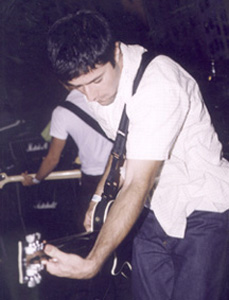 So the lyrics come from Patrick?
So the lyrics come from Patrick?
Patrick: Yeah, I write all the lyrics. I love writing. I’m a scatterbrain, if I don’t write it down, I’ll explode.
Who handles the music?
Patrick: I write a lot of that, too.
Don: Patrick’s the songwriter. He’ll bring something to us, and we’ll go off on our own with it.
Patrick: They know how to play my ideas, whereas I’m not a very technical guitar player. I never took lessons and I bought my first guitar during my sophomore year of high school. I played punk rock songs… Everyone in the band has a big part in the formatting, adding, and layering of the songs.
Tell me about the new, “melodic” Fastbreak sound.
Patrick: I love melody. I love hooks in songs. Not like radio hooks, manufactured music, but… I think there’s a lot of heart in melody. And when you hear that, it’ll be something that sticks with you. It’s a big part of the song that you hold on to, like the soul of the song. What we were originally doing with fast hardcore… well, it became hard to do because so many others were doing it. More people started playing fast, joining the “old-school revival” that we were somehow a part of, even though that wasn’t our intention. We just wanted to create a sound that was Fastbreak. And it’s funny because, to do that, we had to write what we wanted and not write for our audience.
We’ve almost been kicked out, ousted, from that scene now. It’s funny because we were playing fast beforehand, in ’94, before bands like Floorpunch and Ten Yard Fight even formed. It’s funny when a fifteen year old at a show yells at me to play a song that I’ve long ago decided to not play. It’s like, you weren’t there three years ago when we got crapped on by metalcore bands. It’s a weird position to be in. I don’t want to sound like I’m whining, but you just can’t win.
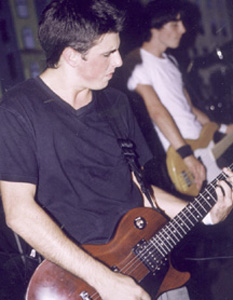 Do you really feel you’ve been ousted? I’ve heard very positive things about the new record. Maybe just the “purest” hardcore scene has taken a disliking to it.
Do you really feel you’ve been ousted? I’ve heard very positive things about the new record. Maybe just the “purest” hardcore scene has taken a disliking to it.
Patrick: People who really care about music, about heart and soul, get it.
Don: Some of the shows lately have been very uneventful while we’re playing… Not personally, but the crowd. Not that they’ve changed, but they don’t know what to expect from us anymore, and vice versa. Maybe they think we’re trying to cash in? Well, we’re definitely not.
I thought that was the whole point of punk/hardcore – not to cash in, but to constantly change and be different than before.
Patrick: Yeah! I always thought it was doing what was inside you. And if people can relate to that, that’s great. Even if they don’t, at least we’re happy with what we’ve done.
Don: Our biggest problem is that we’re starting over. We’ve found our identity, and it’s not black and white anymore. We’re exploring. But a lot of people still only want to hear the old stuff, yelling out “Don’t Stop Trying” or something.
Patrick: It happens at every show.
Don: Literally, every show.
Patrick: It’s so frustrating… We go on tour, and every city that we play in, kids are yelling for old 7″ songs I wrote when I was sixteen. Not that I’m over those songs; I’m proud of them for being the product of that age. But we wrote new songs for a reason. We want to perform them, to get something more recent out. It’s what’s going on in my life now.
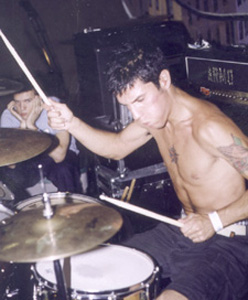 Do you guys ever play any old stuff when the crowd persists?
Do you guys ever play any old stuff when the crowd persists?
Don: Every once in a while.
Patrick: What I’ve been doing is to trying and get someone else to sing those songs so I don’t have to. I get the over-zealous kid and I say, “Listen, if you want to hear the song, get up here and sing it.”
Don: Patrick actually had to play drums for a band in Florida that was covering one of our old songs, “Don’t Stop Trying.”
That’s funny.
Patrick: I thought I might as well give them what they want, but give it to them in a way that was awkward. See, it makes me uncomfortable. I’m trying to elaborate on a new song, and I keep hearing “play this old song” and “play that old song.” My only rebuttal is, “You own the record, you can listen to it at home.”
Don: Then everybody gets mad.
Patrick: And my attitude looks even worse on stage: Mr. Poopy pants…
The people who understand it won’t blame you.
Patrick: I just think our new album has so much to offer… It kills me that people can’t grasp it. It tears me up because I put my heart into that record. I get sad when I listen to some of the new songs because I’ve never written so honestly in my life. I’ve never addressed a trauma in my life so directly. It’s scary to have it out there, and it’s scary to have the criticisms come back and say “this isn’t very honest” or “you guys are trying to cash in,” because that’s not what we’re trying to do at all. We’re trying to create something important to us, and hopefully something important to other people. People who really like the record really love it, and people who hate the record really hate it. We really split our audience.
I think you’re just in a different scene now. You’re playing to a whole other, not necessarily hardcore, crowd.
Patrick: That’s where the business comes in. Learning about a new genre, climbing a new ladder. I don’t want to think that it has to be that way. I think we’re a hardcore band and we’re doing hardcore the way we want to do it. With the same attitude.
You’re not making the conscious decision of changing from one genre to another. The fans could still dig it, but they choose not to. They’re giving you up to another scene. You’re just doing your thing. It’s like “You don’t like it? Fine. Other people will. You can come along if you want because I’m not abandoning you, you’re just not coming along…”
Both: Yeah!
Patrick: Whoa. I feel much better now.
(PO Box 5232 Huntington Beach, CA 92615)

